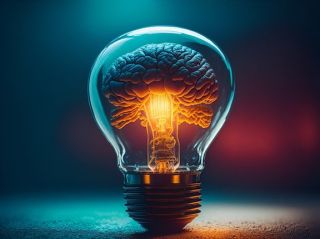Artificial Intelligence
Brace for Cognitive Impact From Artificial Intelligence
Exploring the perils and promise of AI’s accelerated cognitive imposition.
Updated October 20, 2023 Reviewed by Tyler Woods
Key points
- AI's rapid cognitive velocity disrupts traditional human adoption curves, posing ethical and social dilemmas.
- Being "right too soon" with AI technology forces society to confront existential and metacognitive questions.
- AI introduces a qualitative shift in cognition, akin to a transition from classical to quantum computing.
- The imminent cognitive tornado driven by AI compels humanity to adapt or risk obsolescence.

Imagine being right... too soon!
Innovation can be a crushing force — a physical and emotional juggernaut that can redefine entire sectors, societies, and civilizations in its inexorable path. As we peer into the maelstrom of technology’s ever-expanding possibilities—clinging to what guardrails we may find—the question that emerges is not just about what awaits us but about when. Timing, as they say, is everything.
But what happens when the clock accelerates, far beyond our feeble human understanding, into a realm where time becomes elastic? What happens when we are right too soon, when the cognitive velocity of artificial intelligence not only outpaces but fundamentally reshapes human cognition?
We find ourselves at the precipice of an age where being right too soon may be the very nature of disruptive technology, particularly in the realm of artificial intelligence. The pace at which AI is evolving threatens to obliterate the traditional human adoption curve, presenting us with ethical, social, and intellectual quandaries that can be likened to an unexpected tornado tearing through a sleepy town.
Breaking the Conventional Sequence of Human Adoption
Traditionally, technology has nestled into human lives following a sequence of introduction, acceptance, adaptation, and eventual assimilation. A kind of equilibrium has been maintained, allowing the status quo to realign and evolve. With AI, this old-school human adoption sequence is rendered quaint, even naïve. AI doesn’t just augment intelligence; it introduces a new scale and a new speed — a cognitive velocity — that we are not culturally, ethically, or neurologically prepared for.
Being right too soon in this landscape means that the technology’s transformative role begins before society has even formed the questions, let alone the answers. By the time one ethical dilemma has been examined and resolved, multiple new conundrums will have arisen. The lag in human moral reasoning and societal structure could be catastrophic precisely because the technology was right too soon. In an interesting way, it’s akin to exponential cognition, aligning with the contemporary concept of exponential innovation in the marketplace.
AI’s Quantum Leap in Cognition
Think of AI not as a mere computational tool but as a complex layer of cognitive processes that can interface seamlessly with human thought patterns. However, unlike human cognition, which functions more like a classical computer, AI operates in a state that is increasingly akin to quantum computing. This change is not just quantitative but qualitative — a different way of thinking, solving, and existing.
So when the AI algorithm provides an answer, it doesn’t just give us a “solution” in the way we understand it. It can create entirely new paradigms of understanding, new categories of thought that our linear minds must scramble to catch up with. In this quantum leap, our classical cognition faces the dilemma of exponential change within complex systems. And, adding a layer of complexity, questions if the physiology of cognition can even (or ever) keep pace with this techno-velocity of AI-based thought.
The Inevitability of Cognitive Dissonance
AI’s transformative role will likely induce a massive cognitive dissonance within the collective human psyche. The clash will not merely be between man and machine but between different epochs of human understanding. This dissonance arises not just because AI is right but because it is right too soon, upsetting the apple cart of social norms, ethical considerations, and even the core of human identity.
Being right too soon forces us to reconsider not just our ways of doing things but our ways of thinking about things. It propels us into a metacognitive space, where even the act of thought must be reconsidered. This is where philosophy intersects with technology, questioning not just the ethics of AI but the very existential framework we exist within.
The Echo of the Cognitive Tornado
This rapid advance of AI technology, which imposes a new cognitive velocity, will continue to tear into the very fabric of society. We are likely to see a tectonic shift in our collective existential outlook. Institutions, ethics, and perhaps even human consciousness may have to adapt rapidly to avoid obsolescence. In this tornado of change, the shards of our old paradigms will be the seeds of the new world — a world that we can barely conceive of today but will be forced to inhabit tomorrow.
Being right too soon is a paradox, both a blessing and a curse. But as we face this cognitive tornado, the real question is, can we afford to be right too late? In a world hurtling towards unprecedented transformation, perhaps being right too soon is the only way to be right at all.
So, as the cognitive winds whirl and the old structures give way, let us brace ourselves for the advent of the new, however unexpected and disconcerting it may be. In this new world of exponential cognitive velocity, not to advance is to retreat. And in a universe characterized by ceaseless change, to retreat is to perish.




